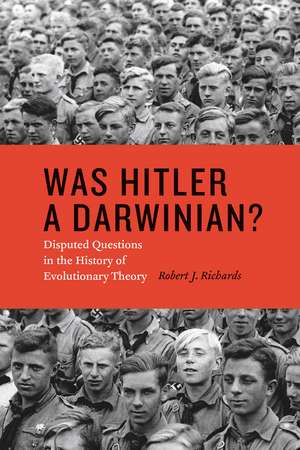Was Hitler a Darwinian?: Disputed Questions in the History of Evolutionary Theory
Autor Robert J. Richardsen Limba Engleză Paperback – 25 noi 2013
In tracing the history of Darwin’s accomplishment and the trajectory of evolutionary theory during the late nineteenth and early twentieth centuries, most scholars agree that Darwin introduced blind mechanism into biology, thus banishing moral values from the understanding of nature. According to the standard interpretation, the principle of survival of the fittest has rendered human behavior, including moral behavior, ultimately selfish. Few doubt that Darwinian theory, especially as construed by the master’s German disciple, Ernst Haeckel, inspired Hitler and led to Nazi atrocities.
Preț: 162.97 lei
Preț vechi: 200.01 lei
-19% Nou
Puncte Express: 244
Preț estimativ în valută:
31.18€ • 32.64$ • 25.96£
31.18€ • 32.64$ • 25.96£
Carte indisponibilă temporar
Doresc să fiu notificat când acest titlu va fi disponibil:
Se trimite...
Preluare comenzi: 021 569.72.76
Specificații
ISBN-13: 9780226058931
ISBN-10: 022605893X
Pagini: 280
Ilustrații: 5 color plates, 33 halftones, 7 line drawings
Dimensiuni: 152 x 229 x 18 mm
Greutate: 0.39 kg
Editura: University of Chicago Press
Colecția University of Chicago Press
ISBN-10: 022605893X
Pagini: 280
Ilustrații: 5 color plates, 33 halftones, 7 line drawings
Dimensiuni: 152 x 229 x 18 mm
Greutate: 0.39 kg
Editura: University of Chicago Press
Colecția University of Chicago Press
Notă biografică
Robert J. Richards is the Morris Fishbein Distinguished Service Professor of the History of Science and Medicine; professor in the Departments of History, Philosophy, and Psychology and in the Committee on Conceptual and Historical Studies of Science; and director of the Fishbein Center for the History of Science and Medicine, all at the University of Chicago. He is the author of numerous books, including, most recently, The Tragic Sense of Life, also published by the University of Chicago Press. He lives in Chicago.
Cuprins
1 • Introduction
2 • Darwin’s Theory of Natural Selection and Its Moral Purpose
Appendix 1 The Logic of Darwin’s Long Argument
Appendix 2 The Historical Ontology and Location of Scientific Theories
3 • Darwin’s Principle of Divergence: Why Fodor Was Almost Right
4 • Darwin’s Romantic Quest: Mind, Morals, and Emotions
Appendix Assessment of Darwin’s Moral Theory
5 • The Relation of Spencer’s Evolutionary Theory to Darwin’s
6 • Ernst Haeckel’s Scientific and Artistic Struggles
7 • Haeckel’s Embryos: Fraud Not Proven
8 • The Linguistic Creation of Man: August Schleicher and the Missing Link in Darwinian Theory
9 • Was Hitler a Darwinian?
Acknowledgments
Bibliography
Index
2 • Darwin’s Theory of Natural Selection and Its Moral Purpose
Appendix 1 The Logic of Darwin’s Long Argument
Appendix 2 The Historical Ontology and Location of Scientific Theories
3 • Darwin’s Principle of Divergence: Why Fodor Was Almost Right
4 • Darwin’s Romantic Quest: Mind, Morals, and Emotions
Appendix Assessment of Darwin’s Moral Theory
5 • The Relation of Spencer’s Evolutionary Theory to Darwin’s
6 • Ernst Haeckel’s Scientific and Artistic Struggles
7 • Haeckel’s Embryos: Fraud Not Proven
8 • The Linguistic Creation of Man: August Schleicher and the Missing Link in Darwinian Theory
9 • Was Hitler a Darwinian?
Acknowledgments
Bibliography
Index
Recenzii
“Scholarly and wide-ranging.”
“An illuminating look at what makes Darwinian theory so slippery, and so magnetic, even to those of us outside the sciences.”
"Richards considers Darwin's theory of natural selection in relation to moral purpose and moves from there to Darwin's principle of divergence and the crucial problem of transmutation of species. Subsequent chapters provide a thoughtful, fresh review of Haeckel's alleged fraud with regard to vertebrate embryos and developmental stages. Herbert Spencer's notion of social Darwinism and the cogent arguments from earlier chapters are brought to bear on the question that occupies the latter part of the book: addressing whether or not Hitler was inspired by Darwinian doctrine to justify his view of race and the preservation of Aryan character. The author brings compelling logic and considerable insight to this question as well as knowledge about who did influence Hitler's thinking. . . . Recommended."
“These essays display the impressive range of Robert J. Richards’s abilities as an intellectual historian and historian of science, as they explore the disparate sources of Darwinian thought in romanticism, theology, ethics, aesthetics, and linguistics. They dispel the notion that Darwin saw the world as purposeless, amoral, and red in tooth and claw, and they bring out the complexity and nuance of Darwin’s accounts of the origins of mind, morals, language, emotions, and humanity. It becomes clear, even before we get to the title essay, that Darwin was an unlikely fountainhead for Nazi ideology, and, for that matter, a poor figurehead for other -isms sometimes connected to him, from social Darwinism, to neo-Darwinism, to atheism and materialism. Richards also gives us an unusually sympathetic treatment of Ernst Haeckel, defends him against oft-repeated accusations of fraud, and reveals a strong affinity between his Darwinism and Darwin’s own.”
“This collection of essays by Robert J. Richards, today’s preeminent historian of evolutionary theory, shows the scholarship and intellectual daring we have come to expect from this author. Knowledgeable and sympathetic toward Charles Darwin, Richards also shows great empathy for Darwin’s contemporaries, from supporters like Ernst Haeckel to rivals like Richard Owen and Herbert Spencer. Witty and engaging on the surface, Richards’s authoritative dismissal of the hypothesis that the roots of Nazi thinking are to be found in the fertile soil of the Origin of Species proves that the volume is held together by a deep moral seriousness and the conviction that the past really matters to the present.”
